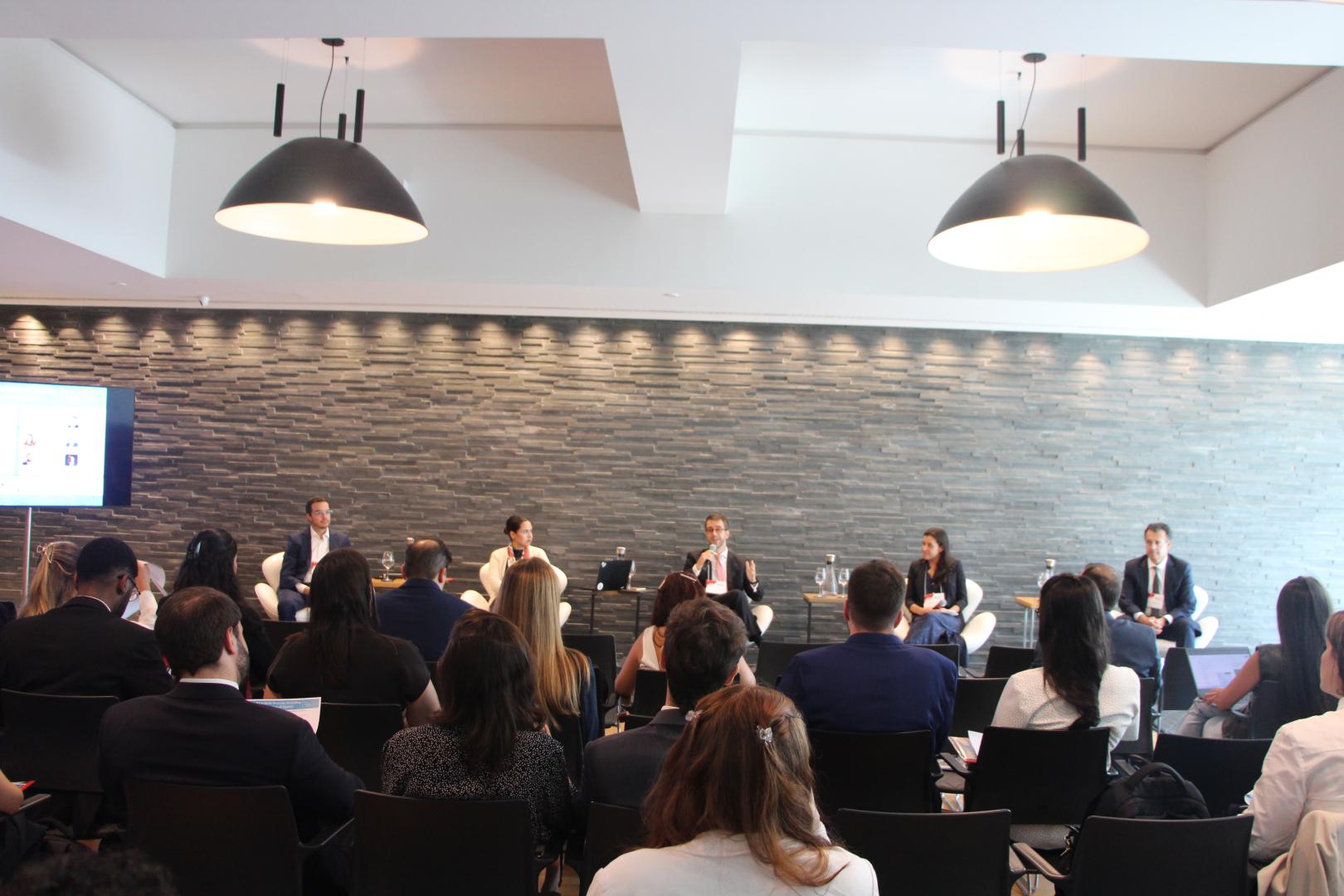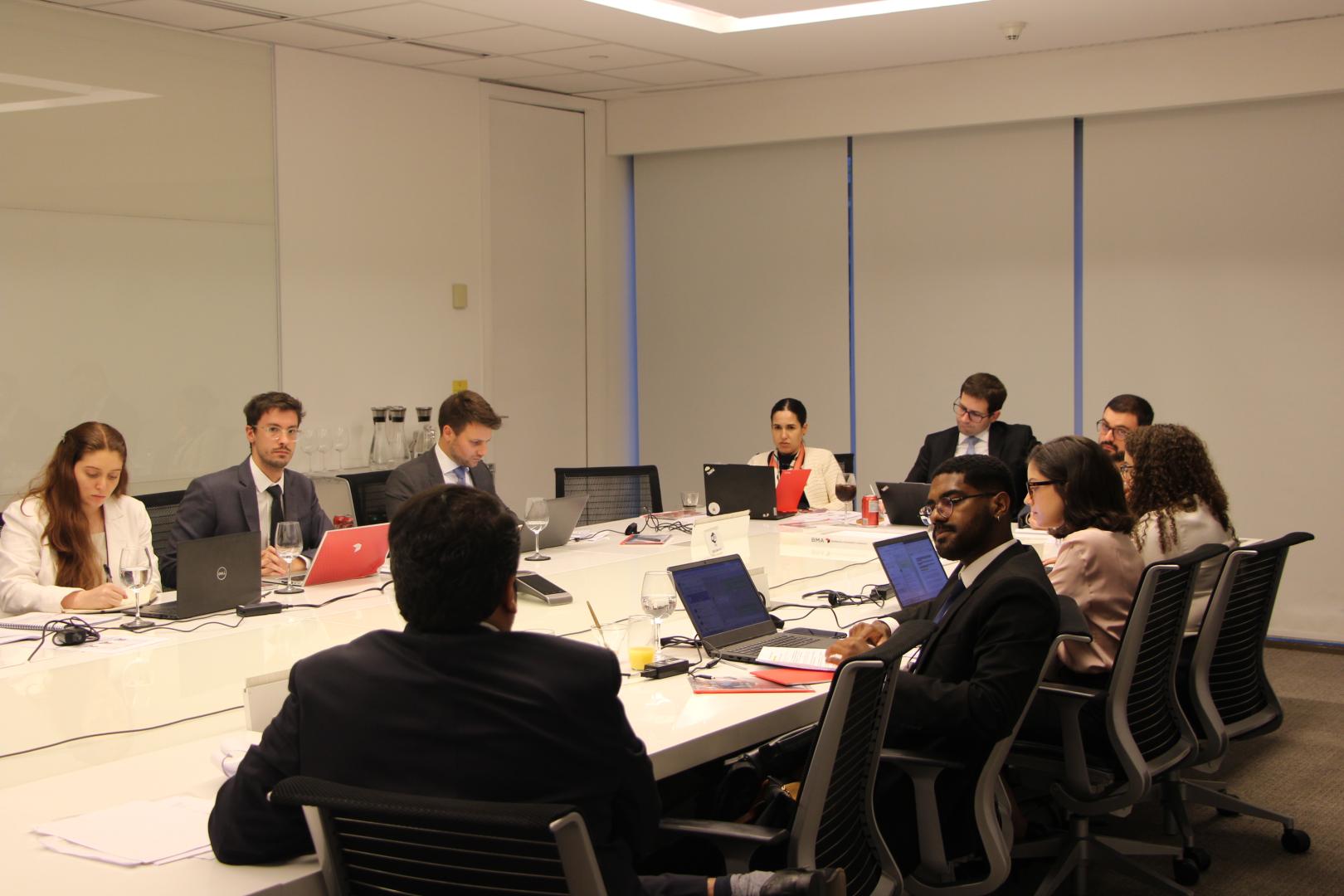Young ICCA Skills Training Workshop – Cross-Examination of Experts
Join us in São Paulo on 12 March 2025 for a Skills Training Workshop on Cross-Examination of Experts.
Cross-examination is one of the most difficult skills for young practitioners to develop. This in-person workshop provides an opportunity to learn from both legal practitioners as well as damage experts involved in international arbitration, as well as conduct mock cross-examinations with leading experts before a live tribunal and receive feedback.
Participants will be arranged into teams to analyse mock damages expert reports and prepare cross-examination outlines. On the day of the workshop, the event will begin with a one-hour+ panel from leading practitioners followed by another one-hour+ panel from leading experts providing guidance on how to conduct and perform an effective cross-examination. Counsel teams will then have an opportunity to cross-examine the opposing side’s experts before a live tribunal and receive live feedback.
Programme schedule:
2:00 – 2:10 PM - Introductory Remarks on Young ICCA (Gustavo Kulesza, BMA)
2:10 – 3:25 PM - “How to conduct an effective cross-examination” (speakers: André Abbud (BMA), Eduardo Damião Gonçalves (Mattos Filho), Mayra Bryce (Payet Rey Cauvi Pérez), Karina Goldberg (FCDG); Moderator: Gustavo Kulesza (BMA))
3:25 – 4:40 PM – “How to perform - and survive! - a cross-examination” (speakers: Daniela Bambaci (BRG), Leonardo Florencio (FTI), Mark Berberian (Analysis Group), Gustavo Galizzi (Alvarez & Marsal), Moderator: Santiago Gatica (Freshfields)
4:40 – 5:10 PM – Coffee Break
5:10 – 7:00 PM – Workshop (cross-examinations & closing arguments, feedback from tribunals)
7:00 – 9:30 PM – Cocktail reception
Registration:
Please note that, due to its format, the workshop will be held in person and will have limited spots available. Applications are now closed. Participants will be informed of their acceptance by 12 February 2025.


Post Event Report – Young ICCA Skills Workshop: Cross-Examination of Experts
By Lucas Stevanato Nakamune (Associate at Tauil & Chequer Advogados in association with Mayer Brown – São Paulo, Brazil) and Marina Junqueira de Moraes Lima (Associate at Lobo de Rizzo Advogados – São Paulo, Brazil)
The Young ICCA Workshop on Cross-Examination of Experts was held on March 12th, 2025, at BMA Advogados, in São Paulo, Brazil. This workshop offered practical advice and tips on the cross-examination of expert witnesses and gave the attendees the enriching opportunity to practice such skills in mock cross-examination sessions.
The workshop began with introductory remarks from Gustavo Kulesza, Young ICCA Co-Chair and Partner at BMA Advogados – São Paulo, Brazil, who gave an overview of Young ICCA and its initiatives, welcomed the attendees and acknowledged the sponsor’s support. This was followed by a panel discussion on how to conduct an effective cross-examination, featuring André Abbud (Partner at BMA Advogados – São Paulo, Brazil), Eduardo Damião Gonçalves (Partner at Mattos Filho Advogados – São Paulo, Brazil), Mayra Bryce (Partner at Payet Rey Cauvi Pérez Abogados – Lima, Peru), Karina Goldberg (Partner at Ferro, Castro Neves, Daltro e Gomide Advogados – São Paulo, Brazil), and was moderated by Gustavo Kulesza (Partner at BMA Advogados – São Paulo, Brazil).
Ms. Goldberg explained the preparation of a cross-examination outline. She reinforced the need for counsel to work closely with the expert and to fully understand the expert reports and the matters discussed. Also, she reinforced the necessity to verify the expert's credibility and independence as well as to check the consistency with the expert’s previous work. She addressed how important it is to separate the topics to be addressed during the cross-examination and stressed the need for persuasion in court and the importance of communicating clearly, even to laypersons.
Mr. Abbud addressed the technique of formulating close-ended and leading questions, avoiding assumptions, and ensuring that each question serves to confirm or deny previous statements. He highlighted the importance of short questions and the appropriate use of technical terms. He also provided some practical examples of questions that made the explanation very clear.
Ms. Bryce explored how to choose the most suitable style of cross-examination for each expert, emphasizing the importance of maintaining a respectful relationship with the witness. She warned about the risk of witnesses who adopt victimization postures and underscored the necessity for profound knowledge of the case. She also warned about an aggressive posture and how this could be misinterpreted by the Arbitral Tribunal.
Mr. Gonçalves shared experiences regarding the hostility that experts may exhibit and the importance for counsel to remain calm and unemotional, asking strategic questions, and knowing when to yield and when to be assertive. He also reinforced the importance of keeping an eye on the arbitrators’ reactions to the questions and the expert’s answers.
In this regard, Ms. Goldberg reminded that keeping the Tribunal engaged is vital, encouraging lawyers to consider how the cross-examination might influence the final decision.
The participants of the panel discussed the difficulties that may arise when working with interpreters, highlighting the importance of careful selection of the translator and the preparation of a glossary, as well as some other difficulties that may arise, such as cultural differences (common law vs. civil law), and online hearings.
Finally, the participants discussed when (or if) counsel should raise objections during the cross-examination and how to conduct the redirect examination, which is normally used as damage control after the cross-examination, as explained by Ms. Bryce.
The second panel addressed cross-examination from the expert’s perspective. This panel featured Daniela Bambaci (Managing Director at BRG – Buenos Aires, Argentina), Leonardo Florencio (Senior Managing Director at FTI – São Paulo, Brazil), Mark Berberian (Vice President at Analysis Group – Chicago, United States), Gustavo Galizzi (Senior Director at Alvarez & Marsal – São Paulo, Brazil), and was moderated by Santiago Gatica (Senior Associate at Freshfields – New York, United States).
Ms. Bambaci addressed the preparation of the expert for cross-examination, highlighting the importance of mock questions. Regarding the role of instructions from counsel to the experts, Ms. Bambaci noted that, while it is a key aspect of the expert’s work and requires careful drafting by counsel, it is important to separate the expert’s opinion from the instructions (which are the premises on which the expert’s conclusions stand). Finally, Ms. Bambaci noted that hot tubbing can be useful as it is an opportunity to have the tribunal’s full attention and usually deals with the most sensitive issues of the case.
Commenting on the expert’s preparation techniques, Mr. Florencio highlighted the importance of anticipating possible questions when drafting the report and conducting a thorough review of the report and supporting documents in advance of the hearing. He also commented on the work of tribunal-appointed experts, which are commonly used in Brazilian domestic arbitrations. On this topic, Mr. Florencio noted that acting as a tribunal-appointed expert can be more time-consuming than acting as a party-appointed expert (as the tribunal-appointed expert usually needs to answer queries from both parties) and requires the need to ensure that both parties engage with the expert equally.
Mr. Berberian discussed direct examination and techniques for fending off credibility attacks during cross-examination. On the topic of direct examination, he added that it can be helpful to get the expert familiarized with the room and to deal with sensible issues in advance of cross-examination, as a matter of transparency with the tribunal. Regarding how to fend off credibility attacks, Mr. Berberian emphasized (i) having a transparent CV, (ii) being aware of public information regarding your previous work experience, and (iii) being prepared to explain why any previous opinions (if contrary) do not apply to the expert’s conclusions in discussion at the hearing.
Mr. Galizzi addressed cultural differences and virtual versus in-person hearings. Regarding cultural differences, Mr. Galizzi commented on the differences in the training of civil law and common law professionals (both lawyers and experts), which result in different approaches to cross-examination. With regard to different hearing formats, he highlighted that virtual hearings require additional preparation and testing to ensure that the venue from which the expert will testify is organized and quiet, and that all electronic equipment is fully operational. Mr. Galizzi also noted that in virtual hearings it can be harder for the arbitral tribunal to read the expert’s body language.
After the coffee break, the mock cross-examination sessions took place. Each session involved an arbitral tribunal (comprised of seasoned practitioners), two teams of young practitioners acting as counsel for the parties and two expert witnesses (acting as party-appointed experts for each counsel team). The counsel teams had the opportunity to conduct cross and redirect examination of the expert witnesses based on a mock case provided in advance of the event. Participants were expected to read the case materials, prepare the cross and redirect examination questions and act as counsel for the parties in the mock sessions. At the end of the sessions, the arbitrators provided valuable feedback to the participants.
The panels and the mock sessions provided practical insights and techniques on the cross-examination of experts. It was a valuable opportunity for young lawyers to practice these skills in a challenging mock environment.
To close the event, all participants were invited to a cocktail reception offered by the event sponsors.

Want to receive event updates from Young ICCA?
Sign up for Young ICCA Membership and you'll receive event notifications direct to your inbox.





